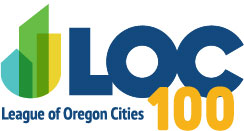LOC News
Action Alert – Local Marijuana Tax Increase
Cities - the short legislative session has arrived, and we need your help!
Marijuana taxes in Oregon include a 17% point of sale state tax, plus a local tax of up to 3%. Until the end of 2020, cities and counties each received 10% of net revenues from the 17% state tax. Under Measure 110, which passed in 2020, cities and counties will split a capped amount of $9 million annually, which is not indexed and will not grow with the market. The loss to local governments in the current biennium is estimated to be about $50 million.
For the 2022 legislative session, our position on marijuana taxation generally remains the same as our position in 2021. First, the LOC is requesting the backfilling of the $50 million cities and counties are projected to lose over the current biennium due to Measure 110 changes in the 17% state marijuana tax distributions. We are open to other ideas, but feel the most straightforward way this could be accomplished would be to increase the capped amount that goes to cities and counties and allow the cap to increase with inflation. This could be a long-term solution to put local government funding back to the level seen before Measure 110. The House Revenue Committee has a bill, HB 4056, relating to “distribution of marijuana tax revenues,” but it currently only addresses indexing of the capped amount and will require an amendment to accomplish the $50 million backfill.
Second, consistent with our position even before the passage of Measure 110, the LOC is requesting that local residents have the opportunity to increase their local marijuana taxes to a new maximum of 10%, up from the current cap of 3%. We feel that local taxes are less likely to be diverted in the future to other legislative priorities, and local residents are best positioned to understand the needs of their specific communities. Senator Findley has a legislative concept that addresses the issue, SB 1506, which will be introduced in the Senate Finance and Revenue Committee.
We are sensitive to the concerns of the marijuana industry but remind them that this tax on consumers is passed through by the retailer. Industry numbers on total tax rates speak to an issue with federal income tax regulations, not local sales taxes. We will continue to lobby for changes at the federal level to allow income tax deductions of ordinary business expenses by marijuana businesses. Washington state provides the best empirical example of a state increasing their retail marijuana tax, and unbiased academic research papers by the University of Oregon and UCLA/Yale do not support the bill opponents' projections around a rush to the black market. Even with a local tax of up to 10% and a state tax of 17%, Oregon’s total tax would still be well below Washington or California.
Action Requests for Cities:
- Please contact your state senators and representatives, let them know your city supports Senator Findley’s bill, SB 1506, to allow local residents to increase local marijuana taxes up to a new 10% limit (from the current 3% cap). This is the same concept that passed the Senate by a 23 to 6 vote in the 2021 session.
- Please also ask your legislators to support amendments to HB 4056 to backfill local revenue losses due to Measure 110 changes in distribution of the 17% state marijuana tax. The revenue losses from Measure 110 have already hit cities and the Legislature should not let another session pass without taking action.
Thank you in advance for your help on this important legislative priority for cities! Find your senators or representatives here.
Contact: Mark Gharst, Lobbyist - mgharst@orcities.org or 503-991-2192
Last Updated 1/28/22
View all LOC news

